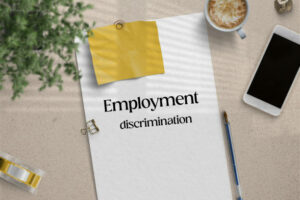
If you have recently been demoted, you may feel at a loss at what to do. It is likely your demotion came to you completely out of the blue. And it may seem like you are being punished for all the good work you have done for your employer.
A demotion is often the result of circumstances that you cannot control. It could be that you were the victim of a business restructuring or cost cutting. Or it could be that your boss has misjudged your capabilities, thinking you were not suited for your role. Your boss may have also acted based on perceived performance issues – that is, performance issues that may not necessarily be true.
If you have been demoted, you are not alone
When someone has been demoted, one of the first things they might do is seek support and guidance online. On social media platforms like Reddit, there are countless posts detailing the experiences of those who have been demoted. In one particularly emotional post, a 25-year-old female detailed her experience of being demoted.
“I’ve been demoted at work (and may soon be fired), and have been tasked with training my replacement,”
A employee wrote in the post. She had worked in a small office as an admin/project coordinator. Having devoted nearly four years to the company, her demotion seemed particularly unjust.
The coordinator described herself as someone who maintained a stellar attendance record. She had also gotten along with all her coworkers and generally performed well. However, in the few months preceding her demotion, she had come under fire from management due to perceived performance issues.
“The nature of my position requires extreme focus and attention to detail, which I sometimes struggle with. Despite my hard work, I’ve made a few slip ups,” the coordinator wrote. Her response to these challenges had been to redouble her efforts, and she believed she had successfully demonstrated her worthiness. But then, she was invited to a meeting with her boss.

Coordinator is demoted and asked to train replacement
“I was informed that management had made a decision to strip me of my duties and title, and they would be given to a coworker (I’ll call her Jane for the purposes of this post). I would basically function as someone to answer the phone at this point, with very little responsibility.”
For someone who had invested years of dedication and hard work into her role, this news was simply devastating. To make matters more challenging, her boss informed her that training her replacement, Jane, would be her new responsibility. Given the complexity of her previous role, this training process was expected to take three to six months. She was asked to start training Jane the following Monday.
Coordinator deals with the emotional turmoil of demotion
The emotional toll of a demotion is often underestimated. The coordinator wrote that the ordeal had been “very stressful and alienating.” She felt blindsided by the decision. And to add insult to injury, her manager publicly announced Jane’s takeover of her role at an all-staff meeting.
The emotional impact was compounded by the fact that no one approached her to ask what had transpired. In this situation, where quitting was not an option due to the responsibility of being a single parent, she faced an extraordinary challenge.

What to do when faced with demotion
Facing demotion can be emotionally distressing, but there are constructive steps you can take to address the situation and protect your rights:
1. Seek clarification
If you have been demoted, the first step is to seek clarity from your employer. Ask for specific reasons behind the decision and request a written explanation if possible. Understanding the rationale can help you assess the situation more objectively.
2. Review your employment contract
Carefully review your employment contract to understand your rights and responsibilities. This can help you determine whether the demotion is in violation of any contractual agreements.
3. Consult an expert
If you believe the demotion is unlawful or discriminatory, it is advisable to consult an employment relations expert. They can provide guidance on your rights and potential legal actions.
4. Consider alternative solutions
Discuss with your employer whether there are alternative solutions to the demotion. This could involve additional training or a trial period in the new role to prove your capabilities.
5. Document everything
Keep detailed records of all interactions related to your demotion, including emails, meetings and conversations. This documentation can be valuable if you decide to pursue action via the Fair Work i.
6. Explore internal options
Some companies have internal procedures for addressing demotions. Check if your organisation has a grievance or dispute resolution process that you can utilise.
7. Maintain professionalism
Dealing with the emotional impact of demotion can of course be challenging. But it is essential to maintain professionalism and continue performing to the best of your abilities. This can improve your chances of regaining your previous position or finding a new opportunity.

Understanding the laws around demotion in Australia
If you have recently been demoted, you may have concerns that your demotion was not lawful. In Australia, demotion is subject to certain laws and regulations to ensure fairness and protect the rights of employees. This includes:
1. The Fair Work Act 2009
The Fair Work Act 2009 serves as the foundation for employment law in Australia. It contains provisions related to demotion, ensuring that employers act fairly and reasonably when making such decisions. Demotion can be lawful if it is based on genuine operational reasons, performance issues, or restructuring efforts. However, it cannot be used as a form of punishment, discrimination or retaliation.
2. Anti-discrimination laws
Australia has strong anti-discrimination laws in place, such as the Sex Discrimination Act 1984, the Age Discrimination Act 2004, and the Disability Discrimination Act 1992. These laws prohibit demotion based on factors such as age, gender, race, disability or any other protected attributes.
3. Unfair dismissal laws
If an employee believes their demotion was unjust or unfair, they may have recourse through unfair dismissal laws. The Fair Work Commission can review such cases to determine whether the demotion was reasonable and lawful.
What can I do if my demotion was unlawful?
Under the Fair Work Act 2009, a demotion can be legally considered a dismissal if it significantly reduces your pay or duties. In this case, you are entitled to challenge your demotion by making an unfair dismissal claim with the Fair Work Commission. You are entitled to do this even if you are still working for your employer.

Unfair dismissal case: When demotion equals dismissal
An example of an employee who challenged their demotion via the Fair Work Commission is unfair dismissal case Scott Harrison v FLSmidth Pty Limited T/A FLSmidth Pty Limited [2018]. In this case, the Fair Work the Commission found that the demotion of an employee amounted to a dismissal, highlighting the significance of reductions in remuneration and duties in determining such cases.
Scott Harrison had been an invaluable Service Supervisor at FLSmidth for more than three years when he violated the company’s stringent alcohol policy. Mr Harrison found himself demoted to the role of Mechanical Service Technician – Experienced. The position came with a notably reduced salary.
The breach that led to his demotion stemmed from Mr Harrison’s failure to conduct pre-work Blood Alcohol Content testing on his team. The company’s response was stern. It issued Mr Harrison a final warning and emphasised that the alcohol consumption within his team had reached a “significant risk level.” Notably, two team members had consumed a staggering 29 drinks between 6.30 pm and 10 pm at a local bar on the eve of work.
Despite the demotion, Mr Harrison opted to continue his employment with FLSmidth. But feeling he had been unfairly treated, he soon lodged an unfair dismissal claim with the Fair Work Commission.

Employer argues demotion was lawful at Fair Work Commission
Facing the unfair dismissal claim, FLSmidth argued to the Fair Work Commission that its demotion of Mr Harrison was lawful. The company argued this point based on three pieces of evidence. Firstly, FLSmidth stated that the demotion was allowable under the terms of his employment contract. This is because the “location” clause stipulated that Mr Harrison could be required to assume different duties.
FLSmidth also highlighted that the contract contained an “unwritten express term of employment.” This stated that an FLSmidth supervisor could face demotion at the discretion of the company, without requiring a formal dismissal. Finally, FLSmidth argued to the fair work commission that the idea of Mr Harrison being demoted was first suggested by him.
Fair Work Commission rules on the unfair dismissal case
The Fair Work Commission meticulously assessed the arguments of both parties and reached several critical conclusions. Firstly, it was found that Mr Harrison’s demotion led to a profound reduction in renumeration and responsibilities. He had experienced a 9.3 per cent drop in his base hourly rate of pay. This included a reduction in overtime rates and superannuation contributions.
Secondly, Mr Harrison had experienced a substantial downscaling of duties. In his previous capacity as a Service Supervisor, Harrison had been entrusted with supervisory and organisational duties. His demotion relegated him to a role that primarily involved manual labour. He was performing tasks “on the tools” within the workshop, bereft of supervisory obligations.

Fair Work Commission disagrees with employer’s argument
Thirdly, the Fair Work Commission found that Mr Harrison’s employment contract did not extend an unequivocal right to the employer to change his role. The contractual right was confined to accommodating FLSmidth’s evolving business needs. This did not give the company the right to demote Mr Harrison as a form of disciplinary action for alleged misconduct.
Finally, the Fair Work Commission found that FLSmidth had not provided Mr Harrison with a formal demotion offer. It was accepted that Mr Harrison had alluded to the possibility of stepping down to a technician role during a show-cause meeting. However, pertinent discussions pertaining to the precise terms of his demotion, including remuneration adjustments, had not taken place.
Based on these findings, the Fair Work Commission ruled that Mr Harrison’s demotion was primarily driven by FLSmidth’s actions. It was therefore deemed a dismissal under section 386 of the Fair Work Act. The Fair Work Commission thereby sanctioned Mr Harrison’s unfair dismissal claim to proceed to a formal hearing.

If you have been demoted, you can fight back
Being demoted is a challenging experience that can have a significant impact on your career and well-being. However, it is important to remember that Australian laws are in place to protect your rights and ensure that demotions are fair and reasonable.
If you find yourself in this situation, seek legal advice, document everything, and explore all available options to protect your professional interests. Remember, a demotion is not the end of your career but an opportunity for growth and resilience.
Had your rights violated at work? Contact A Whole New Approach today.
Whether you have been unjustly demoted, unfairly dismissed or discriminated at work, you have the means to take action. Our team at A Whole New Approach can help you understand if you have a good case to pursue with the Fair Work Commission. But time is critical – you have only 21 days from your dismissal date to file a claim with the Fair Work Commission.
Employers fear us for our reputation. We have helped over 16,000 Australian workers take action via the Fair Work Commission in the last thirty years. We know how the system works and the laws around it. So we can help you quickly understand if you have a case to make, and how to go about it. All workplace investigations, and workplace harassment issues call us immediatly.
We offer a no win, no fee service. And your first consultation with us is free. Contact A Whole New Approach today at 1800 333 666 to access the support you require.






